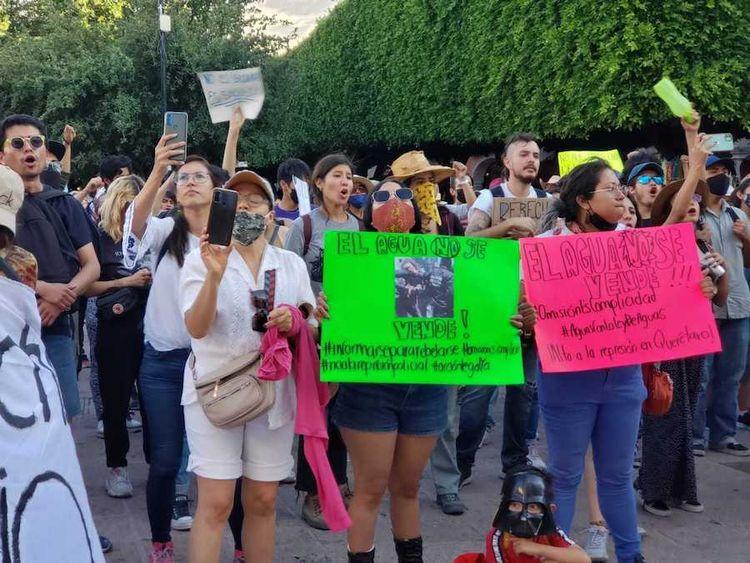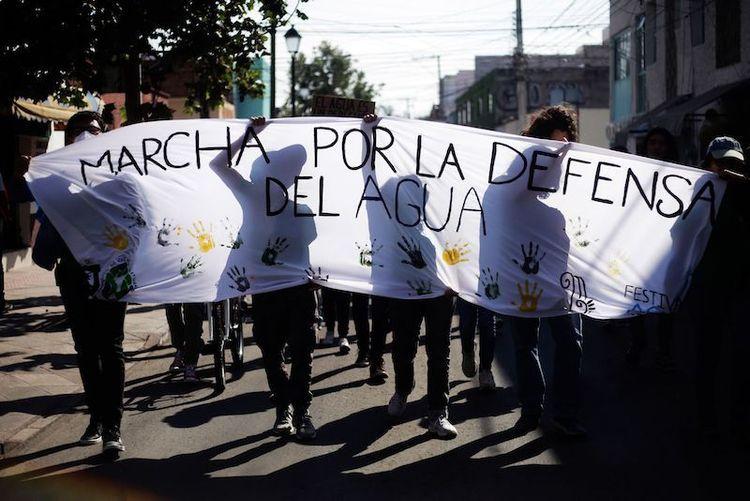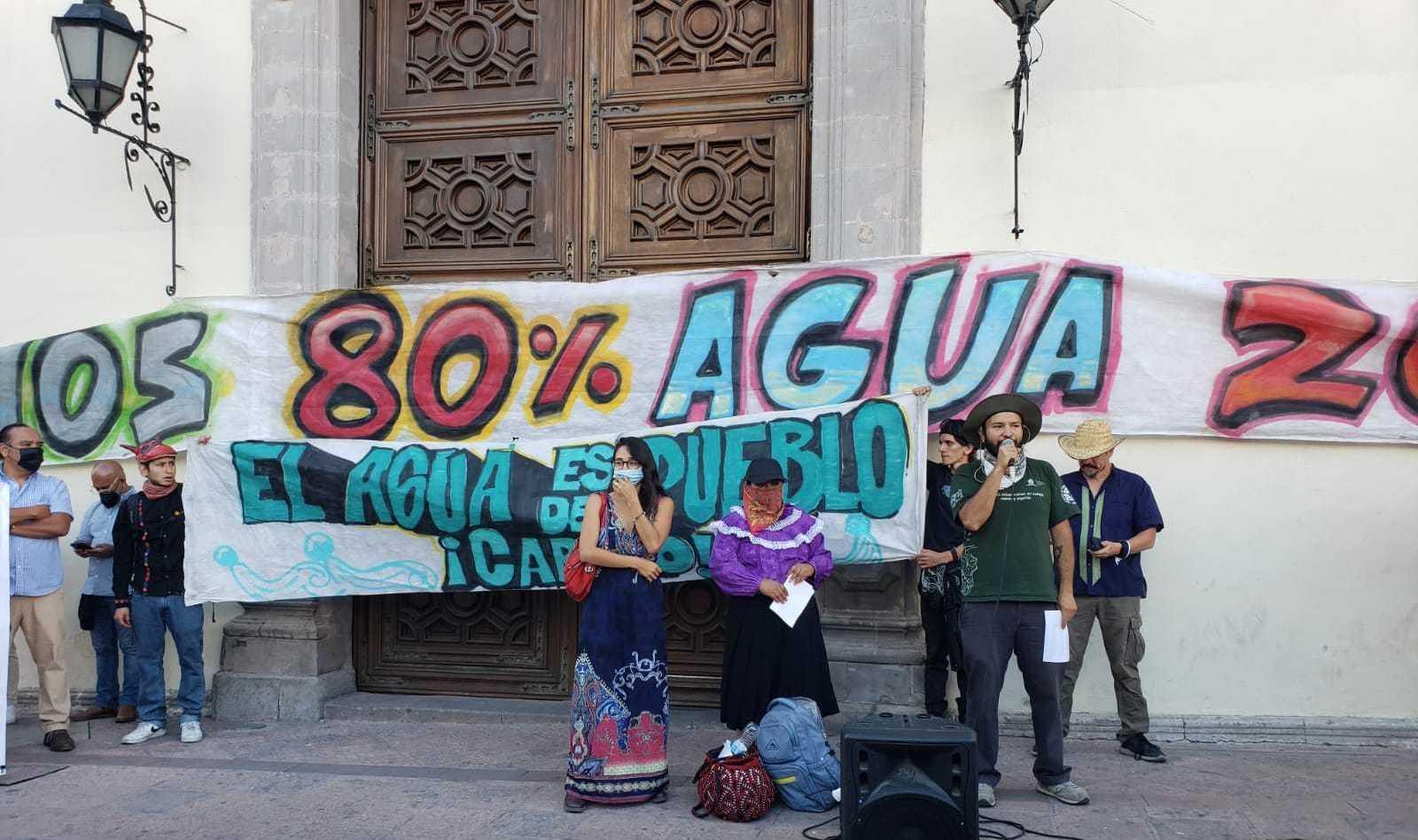As the urban area of the city of Querétaro expands, tension grows between citizens and companies over the management and supply of water, in an area with a high tendency to drought, which worsens year after year.
On May 19, in the midst of protests, the Querétaro Congress approved the Law that Regulates the Provision of Drinking Water, Sewerage and Sanitation Services.
“It's a law to favor real estate companies,” said Claudia Romero, a member of the organization Bajo Tierra, categorically.

Photo: Khalid Osorio.
This Act stipulates that the private sector may participate in the provision of public drinking water, purification, drainage, sewerage, treatment and disposal of wastewater, including the recirculation and reuse of such water, through concessions, which will be granted by the State Water Commission (CEA) or by municipalities.
For Romero, who is also a legal specialist in water issues, the concession of public water services is directly related to urban growth and ecological depredation.
The expert stated that this is not a new topic. Between 2006 and 2017, they were presented
four initiatives that had the same objective, to provide private companies with facilities for the provision of public water services, although none of these were approved.
In 2018, the Divisional Concessions Directorate was also created within the State Water Commission.
More than 32 housing developments, spread over an area of more than 13,462 hectares, are authorized to be supplied by 17 private operators, according to the organization Bajo Tierra.
“Operators control more than 28 million cubic meters of water per year through 38 titles for agricultural, livestock, urban and industrial water use,” reads the report 'Public Hoarding, Commodification of the Common'.
Of the operators with concession titles for water supply, eight are related to only two real estate agencies.
Querétaro Water Systems, Desarrollos y Construcciones del Centro, Aquagenis and the Queretana Water Management Agency are linked to Desarrollos de Provincia Juriquilla.
Meanwhile, Aquagenis Industrial Services, Operadora Querétaro Moderno, Hidro Corregidora and Queretana Water and Sewer Supply are linked to Residential Tourism Developments.
“The concession of water service is a very controversial model in the world, in all the cities where it has been implemented. In the case of Querétaro, its main characteristic is that it allows expanding the housing and construction market, the urbanization of spaces where normally you couldn't because they are areas where public infrastructure doesn't reach,” Romero said.
The academic asks to heed the United Nations (UN). Leo Heller, special rapporteur on the human right to drinking water and sanitation, identifies in his report “Privatization and the Human Rights to Water and Sanitation”, published in 2020, three main risks in this model.
The first is the maximization of profits and, therefore, the exclusion of vulnerable communities that are not considered profitable; the second, the concentration of power and land grabbing and, thirdly, monopolization.
The justification of the Act takes as an example the existence of the legal concept of concession as a modality for the provision of water services.
Article 127 indicates that the modalities of participation of the “social or private” sector can be through the concession of water services, public works contracts, contracts for the provision of services or public-private partnership projects, as well as “any other that derives from regulations”.
Guillermo Vega Guerrero, leader of the National Action Party (PAN) caucus, said in his speech at the voting session that the objective is to bring order to the water supply. He argued that this is a positive proposal for the entity.
Teresa Roldan, an environmentalist from Queretaro, said that the Law was approved without consulting the public.

Photo: Cuartoscura Special
Prior to approval, he said, a citizen forum was held, but the positions were not considered. “We were fighting to get in. Of the seven people we were, five voted against and we justified why it couldn't be,” said Roldán.
“From this Forum, concerns and contributions were collected that, once analyzed, served to give it a citizen approach”, reads the Act.
The activist was one of the drivers of citizen protests, to be unhappy with the initiative promoted by the parliamentary group of the PAN.
Demonstrations and repression
Civil society organizations, academics, activists and indigenous peoples, grouped in the Network for the Defense of Water and Life (Redavi), have already celebrated nine weeks in mobilization.
The days of protest in the streets and in front of the Congress headquarters seek to overturn the Law, considering it contrary to the human right to water.
Confrontations with the police, aggression and harassment have been part of the demonstrations, said Teresa Roldán.
On June 10, the police arrested three people during the protest that took place on Avenida 5 de Febrero, one of the city's main roads.
In videos released through social networks, the bodies of grenadiers are seen trying to contain the tumult of disgruntled people.
The international organization Frontline Defenders issued a statement in support of Redavi and condemned the arbitrary arrests during the protests.
The harassment of community leader Braulio Ayala García, a member of the Indigenous Confederation of the San Francisquito neighborhood, was documented, who was arrested and subject to a review by state police on June 14 while driving in his car along Avenida 5 de Febrero.
The international network of environmental associations #EscazúAhora also condemned the actions of the Congress regarding the refusal to listen to citizens and the criminalization of activists.
From the street to the courts
The latest report from the Drought Monitor of the National Water Commission (Conagua) points out that practically the entire state of Querétaro is under water stress. Fifteen of the 18 municipalities are in severe drought, including the capital; two in moderate drought and one 'abnormally dry'.
Claudia Romero assured Journalism Causa Natura that the city of Querétaro is not that far from the situation that Monterrey or other cities are experiencing, with extreme scarcity, mainly in vulnerable neighborhoods.
Redavi presented to the National Human Rights Commission (CNDH) and the State Human Rights Defender's Office (DEDH) the possible impacts on individuals and asked both institutions to promote a remedy of unconstitutionality. However, both declared themselves incompetent, Teresa Roldán said.
Morena's legislators, who opposed the Act, were also asked to disagree legally. With this appeal, they sought to get the Supreme Court of Justice of the Nation to declare this Law as violating the Constitution.
Roldán said that organizations and activists are preparing other ways of legal defense, through amparo.



Comentarios (0)